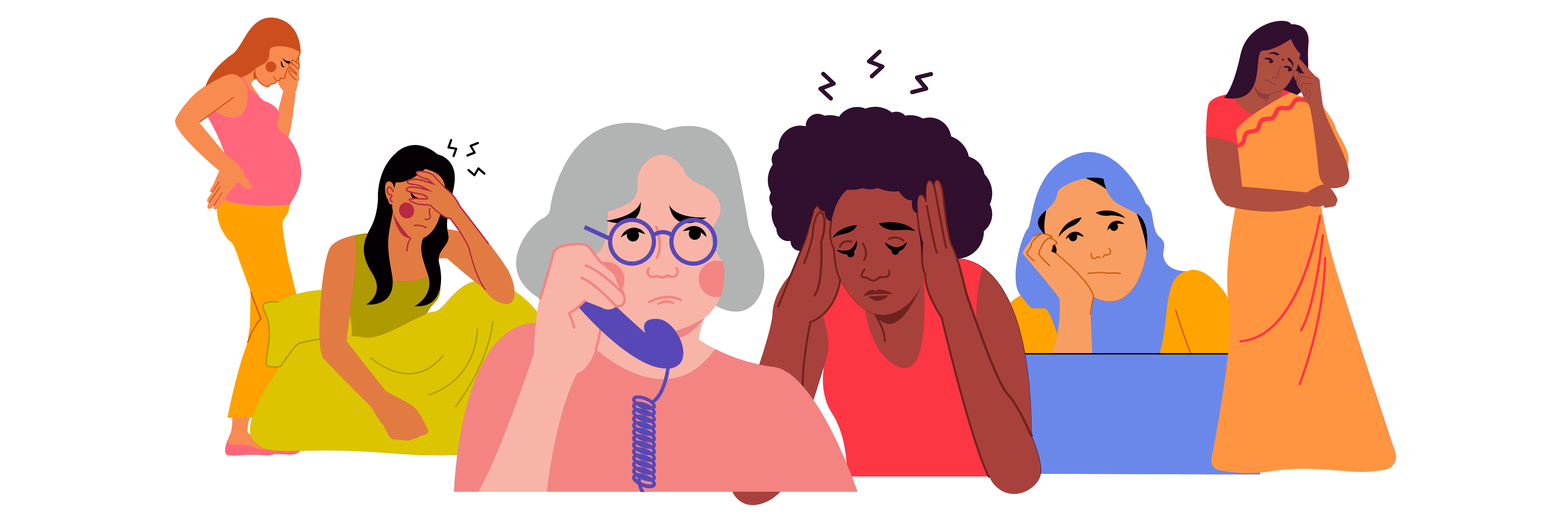Gender Equity in the County
Applying a gender equity lens in the County’s hiring, promotion and contracting processes and services it provides
Guide to Promoting Gender Equity in Recruitment and Hiring
- The purpose of this guide is to highlight the importance and value of incorporating gender-neutral language in all elements of recruitment and hiring as one means of reducing implicit bias.
- The Board of Supervisors ordered the preparation of this Guide to County Services to inform the public of available services.
GIA Fact Sheet
- This fact sheet provides more information on how aims to identify gender imbalances and determine why these imbalances exist.

Economic Mobility
Building partnerships internally across divisions and externally with stakeholders investing in the futures of women and girls.
Chanel Smith (Center), speakers panel for the 3rd Annual Beyond Silos: Domestic Violence and Health Care Partnerships Conference, October 27, 2022.
Los Angeles continues to become increasingly diverse, with women of color now representing almost 70 percent of women in the county. Poverty is a known social determinant of health. Low-income women are at higher risk for obesity, substance use, and chronic stress; most often because they can’t afford adequate housing, food, or childcare.

- A higher percentage of low-income women report having food insecurity, living in unsafe neighborhoods often rent-burdened.
- Women living in poverty are 4X more likely to report a fair or poor health status compared to women living at the highest income level.
- Upon further examination of the economic security of women in Los Angeles County, women tend to have lower median employment earnings than Los Angeles County men
Programs that promote and assist with literacy, high school or GED completion, and college attendance are needed to reduce educational inequity. Improvements in education levels will also expand the type of employment opportunities that make it possible to reduce the proportion of women living in poverty.
Small Dollar Grants for Domestic Violence Survivors
In partnership with the American Rescue Plan (ARP), The Center for Financial Empowerment is preparing to launch a Small Dollar Grant program for domestic violence survivors. Overall, this program will provide $1,250,000 in grants to bolster financial security for survivors of domestic violence who have been severely impacted by the COVID-19 pandemic in Los Angeles County, especially those from historically underserved and hard-to-reach populations. Check back in early 2023 to learn more about this new economic relief program.
Women Experiencing Homelessness
Collaborating with community partners to provide gender-responsive services for women experiencing housing instability.

WGI raised the concern of women’s homelessness and the intersection of DV in their report to the Blue Ribbon Commission on Homelessness. In 2021, the County provided $3M annually to fund the DV shelter system (November 21, 2021)
In recent years, the number of homeless individuals, particularly women, in Los Angeles County has skyrocketed. In 2022, the Los Angeles Homeless Services Authority (LAHSA) reported over 69,000 individuals in Los Angeles County are experiencing homelessness per day, a 4 percent increase from the previous year. Of that population, over 22,000 were women, a significant jump from past counts.
First Supervisorial District Supervisor Hilda Solis (Left) Co-Authored the motion that established the Women and Girls Initiative in 2016 and has continued to invest in vulnerable populations of women and girls in Los Angeles County.
As a response to this crisis, the Women and Girls Initiative (WGI) created the Homeless Women Ad Hoc Committee to investigate the current realities for women experiencing homelessness in Los Angeles County and develop policy recommendations to ensure a gender lens is used by the Board of Supervisors when developing effective aid and solutions to this growing issue. Read more about the Homeless Women Ad Hoc Committee policy recommendations here.
“As a result of systemic inequities, women of color are disproportionately experiencing homelessness. Rent increases, evictions, and the COVID-19 economic downturn have pushed many into homelessness. Today’s motion gives voice to unsheltered single women who deserve the type of support that will set them on course to self-reliance and hope.” – Supervisor Hilda Soli, First District
Gender-Based Violence
Reduce the disproportionate impact of violence on women and girls at all stages of their lives in the County of Los Angeles.
In the United States, girls are becoming the fastest growing juvenile justice population. Black girls experience adverse childhood experiences (ACEs) at rates higher than their white peers and receive a disproportionate rate of out-of-school suspensions starting as early as preschool.
In partnership with the Institute on Inequity and Democracy (IDD) at the UCLA Luskin School of Public Affairs, WGI investigated the school-to-prison pipeline in Los Angeles County to offer policy recommendations that dismantle the problem and enhance the wellness of Black girls. Learn more about the transformative justice approach in Diverting Black Girls in Los Angeles County from the School-to-Prison Pipeline through Intersectional Policy Solutions.
Los Angeles County Offers Safe Haven for Those Seeking Reproductive Health Services
The Los Angeles County Safe-Haven Access Program (SHAP) is a network of nonprofit partners, reproductive access advocates, and health care providers committed to ensuring safe access to reproductive care. SHAP coordinates a multifaceted approach for providing steady and reliable reproductive and sexual health care services for residents of Los Angeles County, and for those who travel here seeking safe and confidential abortions and other sexual health care services, including the provision of practical support to cover travel expenses. SHAP includes plans to ensure a centralized system of sexual and reproductive health care and facilitates the coordination of comprehensive, culturally appropriate training for doctors and support staff, and partners with existing workforce development programs to help promote a viable pipeline of health care providers. SHAP informs partners in the network of legal developments to maintain physical and professional safety and supports the development of a more formalized, safe, and appropriate referral system as Los Angeles County continues to provide this important care, expand services, and operate as a safe haven for all who seek assistance for their reproductive care needs.
The Elephant in the Room: How to Talk to Survivors about Abortion and Reproductive Health
Conversaciones Incómodas Violencia Doméstica, Aborto, y Salud – Traducción al Español
Our panel of experts have compiled a list of resources, in both English and Spanish, relating to the topics that were discussed:
- English Resources
Spanish Resources
(English Resource Folder)
How to Talk to Survivors about Abortion and Reproductive Health
How to Talk to Survivors about Abortion and Reproductive Health
Tools and Resources
- Futures Without Violence
- National Health Resource Center on DV
- CUES infographic/poster
- Reproductive Health Safety Card
- Sexual Health Safety Card
- Virtual Briefing on Intersection of Reproductive Health and Violence and Abuse -Reproductive Justice is Survivor Justice: Bodily Autonomy, Health, and Safety Panel
- Promoting Health Advocacy in Domestic Violence Programs
- Daya Houston- Reproductive Choices Toolkit
- Los Angeles County Domestic Violence Council
- Emergency Contraceptive Pill and the Abortion Pill: What’s the Difference?
- 5 Myths about the Emergency Contraceptive Pill, Busted
Reaching Out Booklets regarding domestic violence (available in English, Spanish, Armenian, Chinese Simplified, Japanese, Korean, Tagalog, and Vietnamese):
https://publichealth.lacounty.gov/dvcouncil/booklet/booklet.htm
Pregnant Survivors
- Appendix B: Intake Questions for Advocates Regarding Sexual and Reproductive Coercion
- Appendix C: Safety Planning Strategies for Advocates regarding Reproductive Coercion
- Additional Resources
Pregnant Survivors, Washington State Coalition Against Domestic Violence, Washington Coalition of Sexual Assault Programs
- English and Spanish Poster: “Birth Control Methods Risks of Detection That Can be Used Without a Partner’s Knowledge”
(Spanish Resource Folder)
Cómo hablar con sobrevivientes de violencia doméstica sobre el aborto y la salud reproductiva- herramientas y recursos
** Los recursos que están total o parcialmente disponibles en español serán resaltados con un fondo amarillo**
- Futures Without Violence (información solo en inglés)
- National Health Resource Center on Domestic Violence (página web in inglés- tarjetas de seguridad y otros materiales a veces están disponibles en español en la tienda de la página web)
- Poster sobre CUES (CUES es un siglo en inglés sobre pasos que proveedores de salud pueden tomar para hablar sobre la violencia doméstica y el abuso sexual- la información está disponible solo en inglés)
- Tarjeta de seguridad sobre la seguridad reproductiva (la página web está en inglés, y se puede ordenar tarjetas en español y otros idiomas)
- Tarjeta de seguridad sobre la salud sexual (la página web está en inglés, y se puede ordenar tarjetas en español y inglés)
- Reunión informativa virtual sobre la intersección entre la salud reproductiva y la violencia y el abuso -La justicia reproductiva es la justicia de sobrevivientes de violencia: Panel sobre la autonomía corporal, la salud y la seguridad (la página web y la reunion virtual están solamente en inglés)
- Promoción de la salud en los programas de violencia doméstica (reporte solo en inglés)
- Daya Houston- Caja de herramientas para las opciones reproductivas (información solo en inglés)
- Consejo de Violencia Doméstica del Condado de Los Ángeles Página web general de recursos para sobrevivientes, proveedores de servicios, etc. (información en inglés, para traducción haga clic al icono del mundo que está lo más arriba de la pantalla en la parte izquierda, y elija “Spanish”)
- Folletos sobre violencia doméstica titulado “Tendiendo La Mano”o “Reaching Out” en inglés (disponible en inglés, español, armenio, chino simplificado, japonés, coreano, tagalo y vietnamita)
Pregnant Survivors (toda la información está solamente en inglés)
- Apéndice B: Preguntas sobre coerción sexual y reproductiva que los promotores contra la violencia doméstica pueden preguntar durante el ingreso a servicios
- Apéndice C: Estrategias para promotores contra la violencia doméstica para planear contra la coerciónreproductiva
- Otros recursos
Pregnant Survivors, Washington State Coalition Against Domestic Violence, Washington Coalition of Sexual Assault Programs
Póster en inglés y en español: “Métodos anticonceptivos que se pueden utilizar sin que su pareja tenga
Small Dollar Grants for Domestic Violence Survivors
In partnership with the American Rescue Plan (ARP), The Center for Financial Empowerment is preparing to launch a Small Dollar Grant program for domestic violence survivors. Overall, this program will provide $1,250,000 in grants to bolster financial security for survivors of domestic violence who have been severely impacted by the COVID-19 pandemic in Los Angeles County, especially those from historically underserved and hard-to-reach populations. Check back in early 2023 to learn more about this new economic relief program.



